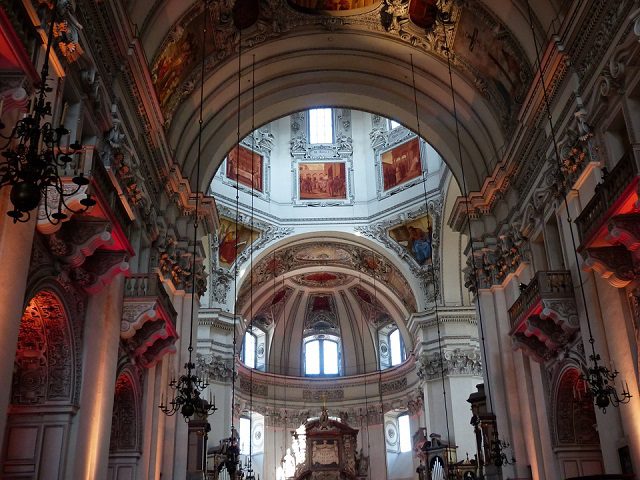
(1-13-09)
* * * * *
1. Let Protestants produce an express statement in the Bible, informing us that the Church lacks binding authority, or that it cannot be trusted to preserve true doctrine.
2. If the Catholic Church is placing its authority “above God,” then the Church fathers en masse are doing the same, because they all appeal to Church and conciliar authority and apostolic succession.
3. What rational person can argue that congregationalism was the normative form of church government throughout Church history, or that episcopacy was not the norm, and was an “unbiblical” system of governance?
4. So the Church is to be obeyed unless and until the time (conveniently the 16th century) when it shouldn’t be obeyed: i.e., when some self-anointed quasi-prophet knows better and decides to dissent and carry along whole countries with him.
5. Luther couldn’t care less about previous Church teaching or patristic teaching, if it disagreed with his own. In due course, he was willing to ditch St. Augustine because he disagreed too much with Luther. How, then, is this a view which respects Church authority?
6. Catholics don’t put the Church above God any more than Protestants put the Bible above God. We think God guides the Catholic Church (just as Protestants and Catholics both agree that God guided and inspired the Bible-writers; but infallibility is a far lesser gift than inspiration).
7. Even if we grant this invisible church, the problem remains of identifying the doctrines of this ethereal, nebulous, mysterious entity. And until the Protestant can do that, it is folly and a pipe dream to pretend it is a foundation or support of “truth” (1 Tim 3:15). It is playing games with reality and logic and the Bible.
8. Luther’s ecclesiology was contradictory: it sometimes referred to the invisible church and other times to a visible one. Lutheranism, after all, adopted a state church model and gave secular princes the power that bishops once had, and this was quite concrete and “visible” indeed.
9. And why must Church be pitted against Scripture as if the two are unalterably opposed and cannot be synthesized? This is not the way that the Bible presents the relationship between the two, or between Scripture and tradition. Why is it impermissible to believe (in faith) in a harmony between the three and a protection by the Holy Spirit from error?
10. Why were the Anabaptists not allowed to be anti-traditional against the five or ten-year-old “tradition” of Lutheranism or Calvinism, and why were they drowned by Lutherans and Calvinists for their dissent, while it was perfectly reasonable for the latter to be anti-traditional against the 1500-year-old Catholic Church? The inconsistencies and absurdities are literally endless.
11. Assuming, for the sake of argument, that one has demonstrated Catholic self-contradiction in dogmatic proclamations: does that automatically make sola Scriptura true by default? Of course it does not. So the Protestant has as much burden of proof in establishing sola Scriptura, as the Catholic does for his system. And Protestants have failed to do so in no
uncertain terms.
12. When Protestants say the church council is merely “human” (in order to dismiss their authority), they forget that this is also true of apostles and prophets. They, too, are just “human,” and sinners, yet God used them to write the inspired revelation of Holy Scripture. We believe God can protect councils and popes in the far lesser way of infallibility, which is far less of a miracle than inspiration.
13. Protestants simply assume that Catholic doctrines can’t be harmonized with Scripture; therefore they conclude that there is a fundamental disconnect between the two, with Church authority or tradition placed higher than the Scripture they supposedly contravene. But the premise remains to be proven. Most Protestants are also unaware of Catholic (and patristic) biblical arguments in favor of Catholic doctrines.
14. The Jerusalem Council as described in Scripture, is a crystal-clear instance of infallible Church authority. Therefore, since Scripture is infallible (and “conservative” Protestants agree), Catholics do not have a fallible belief about infallible authority, but clearly an infallible belief about infallible authority. That’s self-consistent; it’s based on clear and explicit Scripture, which is more than we can say about Protestants in the present conundrum.
15. It is not necessary for each person to have infallible certainty; they simply have to accept the teaching: most conveniently presented in the Catechism of the Catholic Church. To assert that every Catholic must have personal infallible certainty of infallible doctrines, one must presuppose that every Christian believer is a philosopher, with a special grasp of epistemology, which is patently ridiculous. Catholicism is not a philosophical exercise; it is a religious faith.
16. One doesn’t think that a “preserver” of something was the origin of that same thing. That would be as foolish as saying that the salt used to preserve meat (in pre-refrigerator times) created the meat (salt would then equal a bull or a pig). It’s absurd. A guard or guardian doesn’t originate the things he guards (be it a child or a bicycle or a bank). Thus the Catholic Church, in claiming to be a preserver and guardian of Christian doctrine, is obviously not implying that it originated same.
17. So Joe Protestant can dissent from any given Protestant group on Luther’s own foundational principles. How then does any Church possess “real authority”? Such authority must be binding for it to be “real” or sufficient as a unitive force, just as civil law is. If everyone could theoretically and actually dissent from civil law, society would be in chaos. Yet in Christianity, such dissent was raised to a high plateau by Martin Luther and the radical Protestant principle of private judgment.
18. “Sola ecclesia” is a false description of the Catholic system of authority. This is not a Catholic term (whereas sola Scriptura is the Protestant’s own terminology for his principle). We don’t believe in “Church alone.” We believe in the “three-legged stool” of Bible, Church, and Tradition, which is quite a different concept indeed. The implicit reasoning here seems to be: “if you don’t accept Bible Alone, you must believe in Church alone,” as if there are not other possible positions besides this stark contrast: one extreme to another.
19. Many Protestants argue that no particular teaching on ecclesiology is found in the Bible. How, then, do the Protestant ecclesiologies not fall prey to arbitrariness, since Scripture is not “sufficient” for authoritatively determining ecclesiology? The problem is not the lack of an authoritative pronouncement in Protestant tradition (Westminster or Augsburg Confessions et al) but the fact that Scripture is not at all “sufficient” to resolve what would seem to be a fundamental question: the structure and form of the Christian Church.
20. Believing in an infallible Church does not in any way, shape, or form, require some sort of autonomy from God. We’re not the final authority: God is. We believe in faith that He guides His Church. Protestants appear to lack the faith to believe that God could or would do that, which is really the fundamental problem in this discussion: can God do that and would He do it, and did He do so? He certainly did in the Jerusalem Council, recorded in Acts 15, so why is it so unthinkable to hold that He continues to guide His Church? We’re not orphans . . .
21. But even if Catholics weren’t allowed at all to question Catholic teaching (which is largely the case), that is still a different proposition from whether or not that teaching is biblically-based or not. If the Catholic Church’s doctrine is indeed entirely harmonious with Scripture (as I believe), then it may, by its God-granted authority, limit the amount of “challenge” it receives from Catholics (just as Protestants have their creeds and confessions which must be adhered to within the denominational “circle”).
22. Perhaps a Protestant would or could argue that Protestant leaders simply jumped in and replaced the authority that was already in place and had been consistently developing for the previous 1500 years? But on what basis? Why did the Council of Nicaea or Chalcedon have authority to rebuke and anathematize Arian and Monophysite heretics, yet suddenly the 16th century Church no longer had the prerogative to rebuke Lutheran and Calvinist heretics? What sense does that make? On what grounds are we to adopt this radical change of principle?
23. Why is it inconceivable that the Church is simply God’s chosen instrument to preserve and promulgate His gospel truth and fullness of spiritual and theological truth? One might quibble with the fact of that or with the identification of the Catholic Church headed by the pope in Rome as that biblical one true Church which is God’s own: begun and protected by Him. That is one thing. But many Protestants go far beyond that: for them it is a wholly logical argument: one who believes in infallibility is inexorably led to deny the authority of God, which is
sheer nonsense.
24. Protestants usually contend for either of the following two scenarios:
A) God is unable to preserve Christian doctrine without error throughout history by means of (in and of themselves, without His aid) fallen, imperfect, fallible men and an imperfect Church run by such men (i.e., sinners).
B) God was, of course, able to do this if He chose to (being omnipotent), but He chose not to do so.
If they choose A, why do they believe that? Is it because they deny God’s omnipotence? If they chose B, why do they think God would not protect true theology from corruption, especially in light of the biblical teaching that the Holy Spirit will guide us into all truth?
25. Many Protestants irrationally pit the ultimate head of the body (God) against the body of Christ, the Church, which makes no sense. Our claim is not that we are cut off from God and autonomous, but rather, that we are specially guided by the Holy Spirit and protected from error. It’s like a child learning to ride a bike. The parent may be right behind, preventing a fall a few times. The child may not even be aware that the parent is doing so, and so thinks he or she is “autonomous.” But the parent prevented a fall. That is how God is in our doctrine of infallibility. It’s the furthest thing from “autonomous” imaginable. God’s in control of the whole thing.












